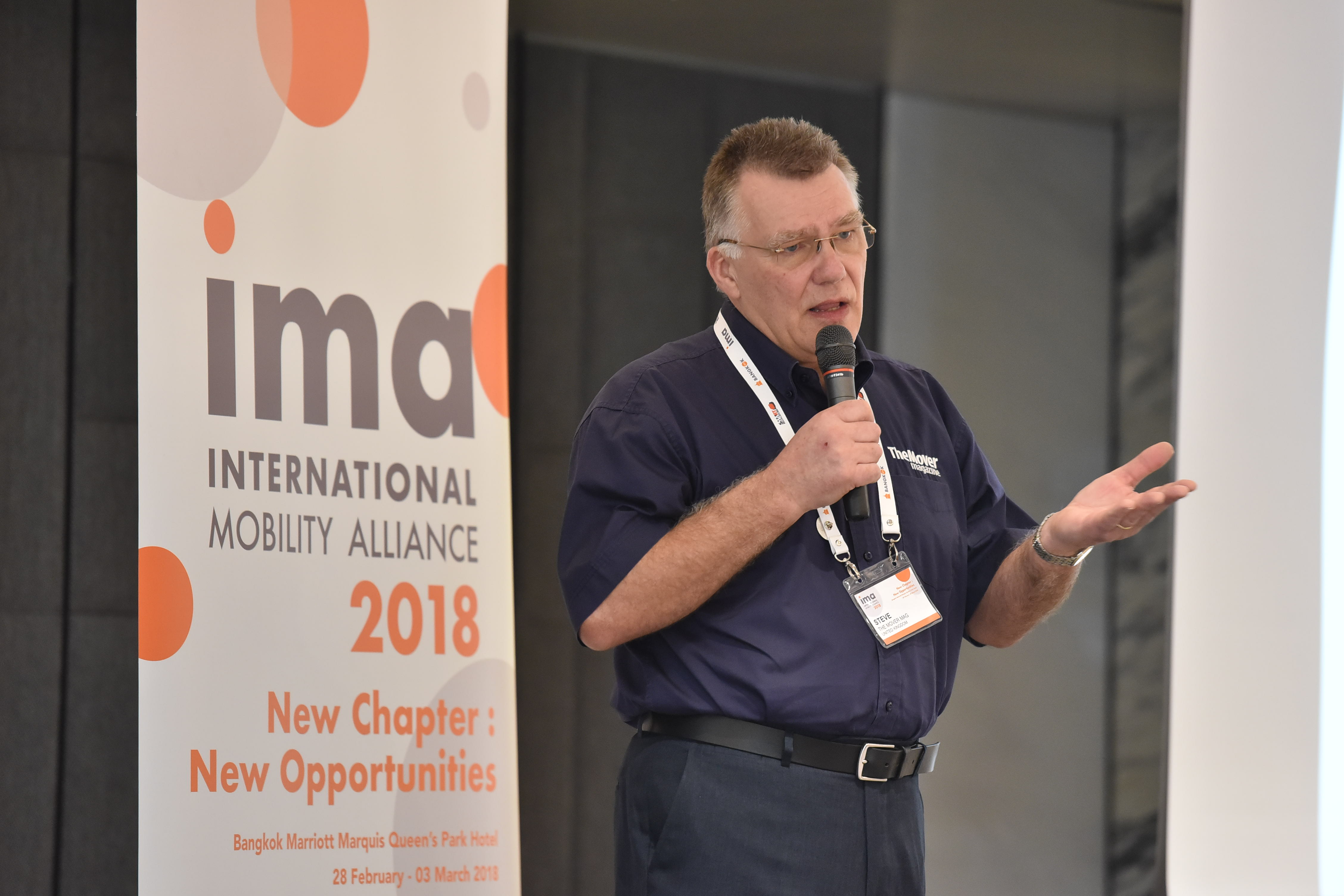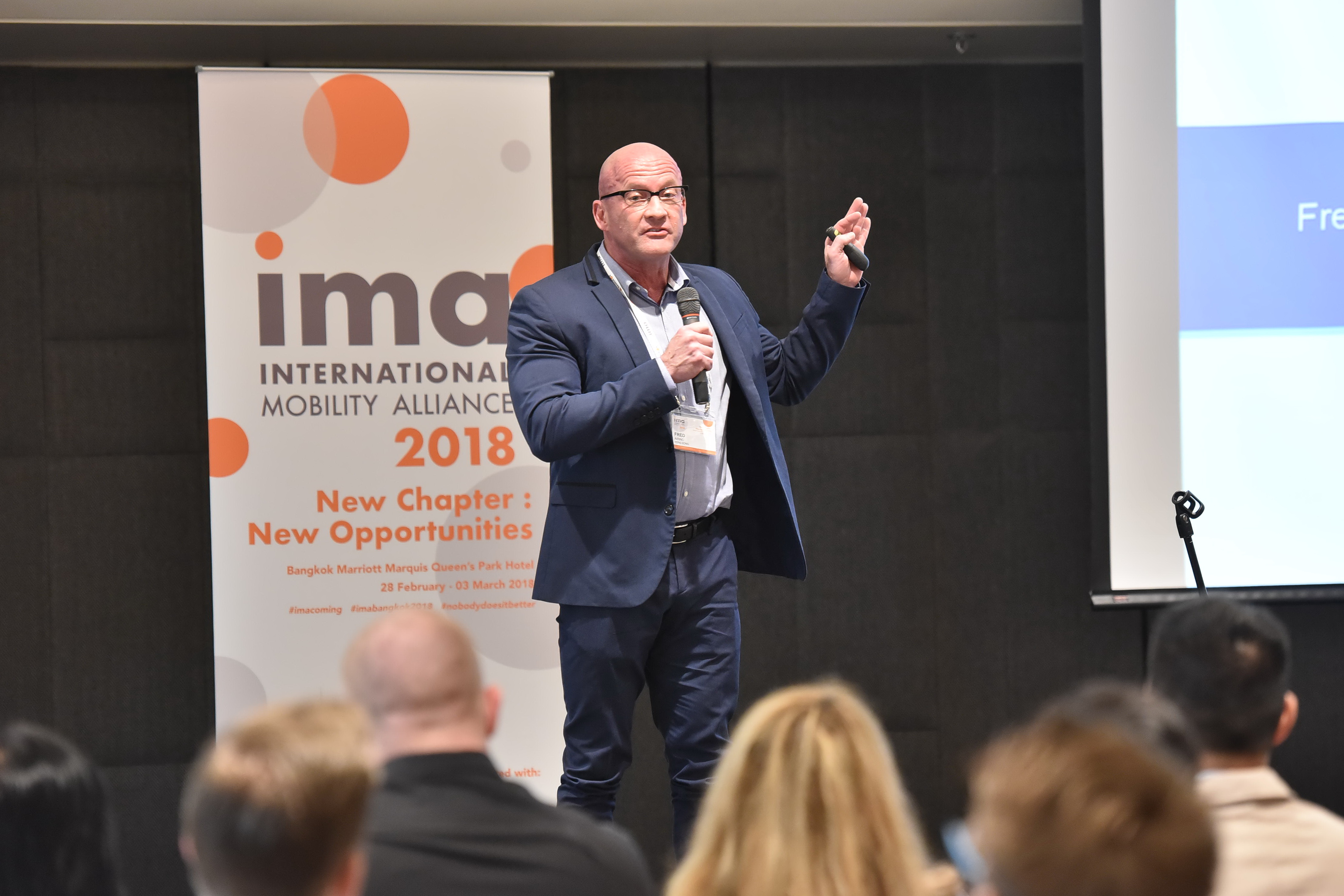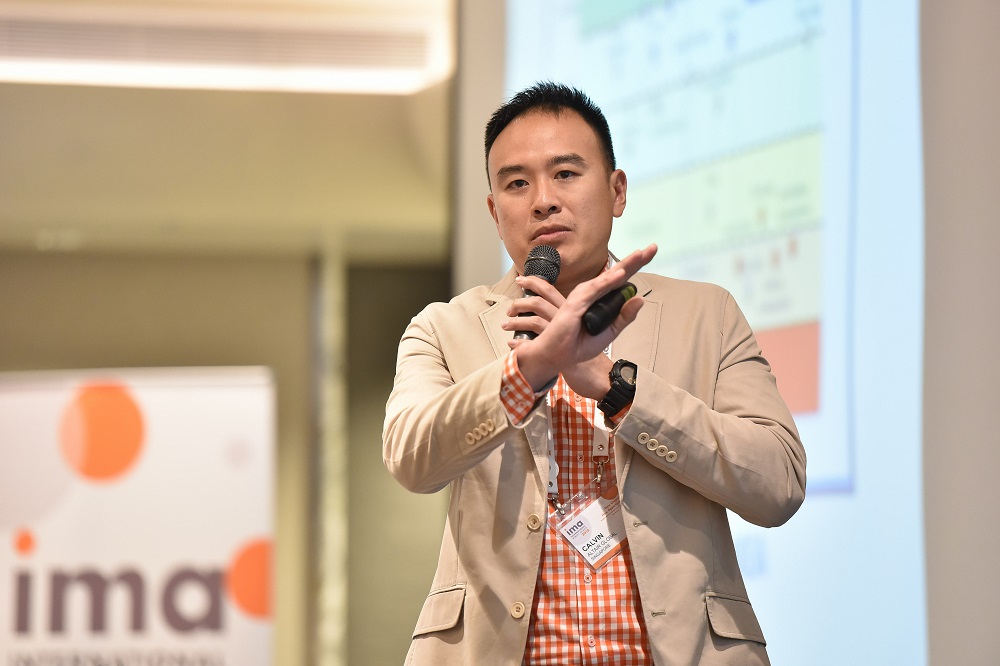The IMA conference did not start, as so many do, with a tedious roll call in which everyone gently drops off to sleep. Instead, it started with a short plenary meeting that was fully attended. Three speakers delivered short presentations on different subjects but all with a common thread: technology.
 Steve Jordan is the editor of The Mover magazine. However, his presentation to IMA was nothing to do with publishing. Instead, he picked up on the theme of the conference ‘New Chapter: New Opportunities’ and appealed to the generations to recognise their limitations when it comes to handling technology and not allow their businesses to be held back by undervaluing the talents of the young.
Steve Jordan is the editor of The Mover magazine. However, his presentation to IMA was nothing to do with publishing. Instead, he picked up on the theme of the conference ‘New Chapter: New Opportunities’ and appealed to the generations to recognise their limitations when it comes to handling technology and not allow their businesses to be held back by undervaluing the talents of the young.
Steve said that he had seen many companies suffer because the older generation was determined to maintain control, restricting the development of the younger generation that followed. He said that had always been a problem but today, with technology developing at such a fast rate, it was even more so.
It is quite clear that young people think differently than their parents. They use technology differently, communicate differently and, through that technology, can make faster decisions. Steve said that his generation had technology thrust upon them and did their best to make it work for them. His children came upon technology much earlier and have a much better understanding of it and appreciation of the opportunities it creates. His grandchildren, however, had technology as part of their DNA, they could not imagine a world in which it didn’t exist.
He said that this did not mean the anyone over 50 had no value; quite the reverse. They have the wisdom of experience which is vitally important. However, in Steve’s opinion, they should use that wisdom to ensure that young people are encouraged, valued and empowered to exert their influence on the organisation. If not, Steve believes they will leave and the company will suffer.
Steve also had a word of warning for the 30-somethings who might think that they have technology tamed. He said that in 15 years, statistically, computing power will be 1,000 times more powerful than it is today; in 30 years’ time it will be 1 million times more powerful. He asked whether anyone would feel confident about using that kind of technology to its full effect. When they were older, the problem would be even more
 Fred Schlomann is the vice president, APAC for Airinc, an international mobility company that has provided data to assignees and their companies for over 60 years.
Fred Schlomann is the vice president, APAC for Airinc, an international mobility company that has provided data to assignees and their companies for over 60 years.
In his presentation Fred looked at the ways in which global mobility was changing, largely fuelled by technology. As examples he said that more than half of the world’s population now has Internet access; three million e-mails and four million text messages are sent every second; and by 2020 it is predicted that there will be 26.3 billion devices connected to the Internet. Using current technology, the number of tasks that can be automated affect $14 trillion in wages and a billion jobs. Fred said that in the last 50 years world GDP has increased six times, per-capita income has tripled and employee output has increased by 2.4 times.
This technology has had a dramatic effect on globilisation. For example, Fred said that in 1958 IBM employed 100,000 people, mainly in the USA. Today the company employs 380,000 people but most work outside the US, mainly in India. Today 62% of people are interested in working abroad, 43% of US employees have worked remotely and the number of ‘digital nomads’, people who can work anywhere, is on the rise.
In recent years companies have generally increased their need for mobility and more of them have formal policies in place. However, what was particularly interesting was the areas in which mobility was expanding. 50% of the increase is coming from short-term assignments, 45% are going on one-way transfers. The number of long-term assignments is significantly lower than in the past. 31% of mobility teams are under cost pressure.
The top challenge for mobility professionals was aligning their programmes with the talent available. However, the top strength was getting people to go on assignment. It appears that there is no shortage of people wanting to work abroad, but the profile of the average assignee has changed dramatically.
 Calvin Chin is global operations manager for Atair Global in Singapore. His company is a relocation management company that started in Texas 28 years ago and now provides global relocation services at origin, destination, in transit and administrative services. Since then it has spread its operations to ten locations worldwide.
Calvin Chin is global operations manager for Atair Global in Singapore. His company is a relocation management company that started in Texas 28 years ago and now provides global relocation services at origin, destination, in transit and administrative services. Since then it has spread its operations to ten locations worldwide.
Calvin looked at the customer experience and the attributes of a preferred supplier. He said that a good customer experience is more than the sum of the parts. He said that it’s possible for all touch points in a relocation to be positive but the overall experience can still be poor. “It’s necessary to focus on the whole end-to-end experience, not just the individual touch points.”
By contrast, Calvin said that not everything needs to be positive for the customer to be happy with the service. He used a trip to IKEA as an example: although a customer might not like the checkout arrangement, the need to assemble the furniture or the delivery option, they still might enjoy going to the store because the café is good or the price is excellent.
So what does an RMC look for in a preferred supplier? Operational capability was key. Although it was important for a company to have its own assets and workforce it was vital that it had sufficient scalability to be able to react at short notice when necessary. The process should be repeatable to guarantee a positive customer experience with sufficient flexibility to deal with exceptions and challenges as they emerge and prevent any re-occurrence if something goes wrong. People should be engaged in the business and, especially for smaller suppliers, they should be empowered to take decisions if the senior member of staff is absent.
The company culture and synergy with Altair was also important to Calvin. The Altair values were ‘Aim high, play it straight and make it fun’. They expected suppliers to show concern, appreciation, respect and empathy. As illustration, Calvin quoted the management consultant Peter Drucker: “Culture eats strategy for breakfast.”